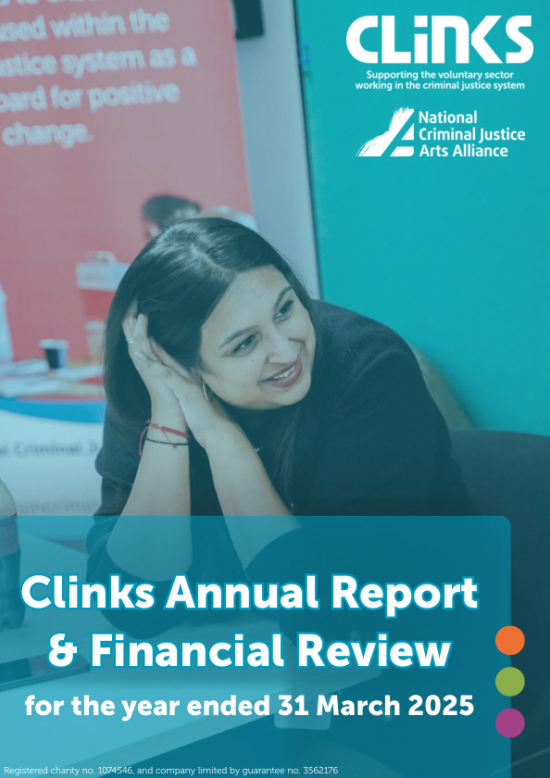Below is a transcript of the presentation Anne Fox, Chief Executive Officer of Clinks, delivered this morning at the launch of the latest trackTR report concerning voluntary sector involvement in Transforming Rehabilitation
 Since 2015 Clinks has been working to track the impact of the Transforming Rehabilitation (TR) reforms on our sector. The report from our latest survey, the third in the trackTR series, paints a very concerning picture.
Since 2015 Clinks has been working to track the impact of the Transforming Rehabilitation (TR) reforms on our sector. The report from our latest survey, the third in the trackTR series, paints a very concerning picture.
The policy intention to involve the voluntary sector at the core of services for people under probation supervision, much lauded at the introduction of the reforms, has not been achieved. However we have identified 11 recommendations which we think are practical solutions that can make a difference and improve the situation now and into the future.
We and the organisations in our sector are passionate about the successful transformation of probation services to improve support and ultimately outcomes for people under probation supervision. We believe this cannot be realised without the effective involvement of the voluntary sector in co-producing services and delivering better outcomes, because of what the sector does and what people need in order to support their desistance.
TR brought significant changes and the rhetoric that surrounded it initially heralded a new age for probation services and promised a central role for voluntary sector organisations. Organisations who have a 300 year history working in this area and whose innovation and responsiveness to people’s needs, in fact led to the formation of what became our probation system.
Since then and to this day, the sector provides a wide range of services that support, but most often are distinct from, the probation supervision delivered by CRCs and the NPS.
These services provide wrap around support to those who have been sentenced by the court; support that responds to the range of needs that might underlie the causes of the behaviour that led to that sentence; and which supports an individual to serve their sentence and go on to desist from crime and live a fulfilling life once their sentence is served - and into the future.
It is these very services which under Transforming Rehabilitation, were meant to have a more central place. As Community Rehabilitation Companies (CRCs) strived to drive down reoffending rates, incentivised by payment by results contracts, they, so the theory went, would engage organisations that would provide these services in order to support them.
Voluntary organisations have not been involved
“We invested huge amounts of time engaging with TR over two years but, in spite of being told we would be contracted, eventually we were not”
However our research, like the reports of the Public Accounts Committee and HM Inspectorate of Probation, has shown that the voluntary sector is not central to probation delivery – very few organisations have found themselves as subcontractors and even fewer small, local or specialised organisations have found a place in the supply chains despite these organisations making up the majority of the sector.
The ‘Black box’ contracts which were designed to give CRCs flexibility and encourage innovation so that a range of services could be brought into supply chains in support of reducing reoffending have in fact allowed the CRCs to include far less voluntary sector organisations in their supply chains than most of them initially outlined in their bids.
Without contractual imperatives, it is difficult to see how under the current arrangements and within current financial constraints for CRCs this situation is likely to change.
We have therefore made three recommendations aimed at improving transparency of the supply chains in order to encourage greater voluntary sector involvement. This includes:
- that the CRCs and the National Probation Service (NPS) should publish full details of their supply chains on a quarterly basis
- that HMPPS should conduct and publish an annual audit of supply chains which would include assessing the experience of organisations within supply chains and collecting and sharing good practice as well as poor
- We also make an offer to work with the MoJ and HMPPS alongside the CRCs and NPS to develop approaches to engaging voluntary organisations and testing and evaluating these in local areas.
Services are unsustainable
“The objectives of TR in terms of increasing supervision after custody and support for resettlement were laudible, but we have yet to meet anyone who believed they would be achieved at the same time as cutting costs”
Possibly more concerning than the fact that the sector hasn’t been involved as intended is that our research has found that where the voluntary sector does have a role its services are under funded, with contracts at risk of failure and/or being subsidised with either charitable reserves or other funding sources.
The MoJ's forthcoming probation review must address this and consider the wider range of interventions and support that needs to be available to support probation services.
From mental health support, to accommodation, to services specifically for people with protected characteristics, and everything in between, the sector provides holistic support to people under probation supervision so that they can successfully engage with that supervision and complete their sentences. The MoJ must work with partners to assess what is a suitable level of funding to ensure these services can be provided to an acceptable standard.
The probation system is being propped up by the voluntary sector
“Some CRCs are great and others are very poor. We provide over 2000+ placements from CRCs with no financial return”
We also found that probation services are relying heavily on the work of voluntary organisations outside of the supply chains with 65% of organisations not funded by CRCs but regularly receiving referrals from probation services and prisons.
This speaks volumes about what the voluntary sector has to offer probation services and this offer must be properly valued. As a minimum in order to nurture local partnership working, CRCs and the NPS should develop multi-agency networks that bring these organisations that they are relying upon together so that their knowledge and expertise can be properly utilised to inform the design and delivery of probation services.
Poor policy is restricting the National Probation Service from working with voluntary organisations
“Nobody seems to know whether NPS can commission services directly with us. I have no idea what the budgets are for purchasing interventions”
Turning to the National Probation Service only two of the organisations that responded to our survey – 2 out of 132 – had contracts to provide services to people under NPS supervision. The rate card which is the mechanism whereby the NPS has to buy services from those organisations in the CRC’s supply chain is restricting the NPS ability to purchase services suitable for their client group and restricts their ability to strategically engage with partners.
The policy has actively discouraged voluntary sector engagement with the NPS and their service users and should be abandoned. The NPS should be able to directly contract with the voluntary sector to ensure the specialise services require to support those who pose a high risk to the community are available.
Voluntary organisations believe Transforming Rehabilitation has a negative impact on their service and service users
“We are being asked to deliver more hours with a skeleton staffing. We are now covering four counties with two staff working four days per week, trying to cover seven community locations and four prisons. This is simply not possible.”
All this has led to poorer than intended service experiences for people under probation supervision. 60% of the organisations who responded to our survey said that TR had a negative or very negative impact on their service users. It’s clear that the policy intentions of TR have not been fulfilled.
As part of the MoJ's probation review an open consultation on the purpose and structure of probation services should be conducted before the end of current contractual arrangements. Any consultation process must find ways to meaningfully engage with the voluntary sector in co-design of a future system in order to ensure that lessons can be learned.
To assist with learning, more research into what ‘good’ looks like in probation services is needed and the MoJ could support this through an annual grant fund for researchers to assess rehabilitation and resettlement activities.
Alongside this MoJ and HMPPS should develop mechanisms to gather the views of a representative sample of probation service users and their families. The Quality of Prison Life survey conducted by HM Inspectorate of Prisons provides an excellent source of intelligence on the impact of prison and the interventions provided in it on individuals and a similar mechanism would be hugely valuable to better understanding and improving probation services.
A volume based and target driven culture is eroding good will
“…we have lost the quality resettlement work that was previously being carried out. The approach is not individual focus but process focused. It is admin heavy which prevents face-to-face contact.”
Overall the organisations we surveyed painted an increasingly pessimistic and negative view of their relationship with CRCs and did not believe that their ethos and values aligned with them. Despite market stewardship principles that expressly attempt to address this issue organisations told us that unhelpful targets focused on volume rather than outcomes were eroding relationships.
New targets and outcome measures need to be developed that focus on quality of work delivered and what it achieves. A working group should be convened to develop proposals for improved measures and this should include statutory services outside of criminal justice who have responsibility for health, housing and education and employment outcomes in order to assist better joined up working.
Confusion about Transforming Rehabilitation could be leading to disinvestment
“It has become very hard to secure funding... Funders believe that the TR model is providing the relevant support, however at the grassroots level this is not happening for the most chaotic individuals.”
Finally, but not any less worrying, TR has negatively affected the level of funding for voluntary led rehabilitation and resettlement services. The lack of clarity around what CRCs and the NPS should be funding has affected the sectors ability to raise funds from other sources. There needs to be clear public guidance on the roles and responsibilities of the main agencies involved in rehabilitation and resettlement.
At Clinks we are passionate about the work our members and the wider sector to do to support rehabilitation and resettlement and believe that probation services can only be effective with their full involvement. We hope that the recommendations in this report are helpful and practical suggestions which we can work with MoJ, HMPPS, CRCs and the NPS to implement to ensure that the sector’s knowledge, expertise and experience can be properly utilised now and in the design of the next generation of probation services.
What's new
Blogs
Anne Fox CEO of Clinks to stand down after a decade of service
Latest on X
The role is for a leader from an organisation focused on racially minoritised people, with expertise in service delivery, policy, advocacy, or related areas in criminal justice. Racial disparities are present at every CJS stage. This role ensures these voices are central in shaping policy to help address and eradicate them. Apply by Mon 18 Nov, 10am. More info: https://www.clinks.org/voluntary-community-sector/vacancies/15566 #CriminalJustice #RR3 #RacialEquity

